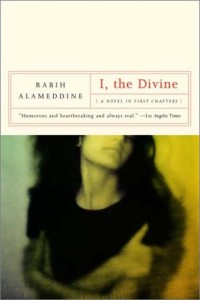One of my favorite novels in recent years is I, the Divine (A Novel in First Chapters), by the Lebanese-American writer Rabih Alameddine. It’s a brilliant novel in the form of a memoir, written by one Sarah Nour El-Din, and it’s an evolving memoir at that, which is where the subtitle comes in. Every chapter in the book is a Chapter One. That’s right, the reader finishes the first chapter, turns the page, and there’s another chapter one waiting. And then another chapter one and so on: page after page of beginnings.
Sarah can’t seem to find the proper footing into her memoir, and so she begins again, trying to start from this angle, then that angle. Though each chapter is in and of itself engaging (at least to this reader), Sarah hasn’t yet captured for herself the right tone, or the most fruitful approach to the rest of her life’s story.
And yet, through all these failed first chapters, the reader begins to gain a deeper sense of her life, as empty narrative spaces slowly get filled in. We learn of her marriages, her lover, her son, father, mother, stepmother, sisters, grandfather, her life in Lebanon and in America, and her artistic ambitions.
Eventually, a first chapter takes on a shameful secret (one of many in this family), that Sarah’s sister Lamia was a serial murderer—a nurse who overdosed her patients to death. Sarah feels she can’t begin to explain her sister’s actions, so instead she announces “I will let her speak for herself” and includes in the chapter her sister’s awkwardly eloquent letters.
Through this seeming defeat of imagination, this reliance on her sister’s own words, something seems to break through to Sarah. Lamia’s letters have allowed Sarah to see her sister from the inside, bringing with it a level of empathy she never had before. Two first chapters later Sarah writes about a day in the life of her stepmother Saniya, from what she imagines is her stepmother’s point of view. And again, her understanding of and empathy for Saniya deepens. A few first chapters later, Sarah imagines a walk through the streets of New York from her first husband’s point of view.
Sarah is of course fictionalizing—she can’t really know what her husband thought as he walked from classroom to apartment, can’t know what terrain her stepmother’s thoughts might occupy. But seemingly for the first time, Sarah is thinking of others, not herself, she is trying to interpret them, understand them. And in so doing, the relentless I, I, I of memoir deepens from the singular self to the multiple competing selves of family dynamics. Sarah is no longer the center of the universe but a part of the universe, and this helps her move from the role of victim to that of survivor, relinquishing blame for compassion.
Alameddine, a fine novelist, is perhaps taking a swipe at memoirs here, by implying that the fictional impulse of imagining others is the remedy for the solipsism of first-person memoirs. Yet the fictional impulse is indeed a major part of our nonfiction selves—constantly, every day, we try to interpret others, try to imagine their inner lives so we can better mesh with them. Because we cannot and will never be able to read minds, our interpretations are necessarily fictional, or at least fictions based upon the best available evidence. As I’ve said elsewhere on this website, “So many thought bubbles, like storm clouds, hover above us.”
Sarah becomes a survivor through imagining the points of views of others in her life because she has released herself from the trap they themselves are stuck in—the inability to empathize. That’s how victimizers go about their business: lost in their own dramas and playing out the echoes on others, unable to truly see the damage they’ve wrought, unable to imagine any point of view besides their own. Victims are locked within their own dramas.
Having escaped this interior claustrophobia, Sarah earns the last chapter of her memoir, which she labels not as yet another Chapter One, but as an Introduction.

